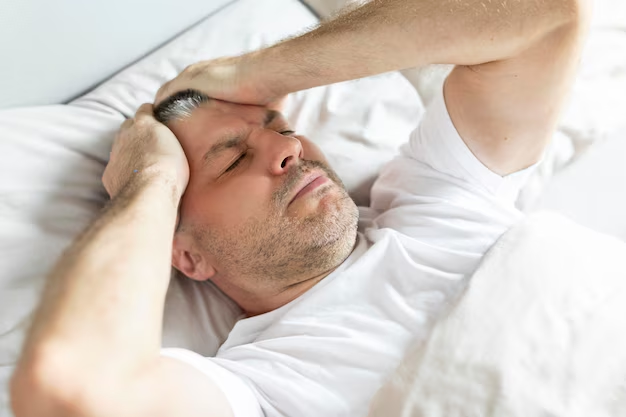Understanding the Impact of Melatonin on Anxiety: Is It a Cause for Concern?
Have you ever found yourself tossing and turning at night, reaching for a bottle of melatonin to help you drift into sleep, only to wake up feeling more anxious than ever? Melatonin, often hailed as a natural sleep aid, is widely used to combat insomnia and jet lag. However, there have been discussions about its potential role in inducing anxiety. Let's delve deep into this concern and explore whether melatonin can indeed cause anxiety, and if so, what you might do about it.
What is Melatonin?
The Basics of the Sleep Hormone
Melatonin is a hormone naturally produced by the pineal gland in your brain. It’s often called the "sleep hormone" because it regulates your sleep-wake cycle. Melatonin levels typically rise in the evening, signaling to your body that it’s time to sleep, and decrease in the morning when it’s time to wake up.
Melatonin Supplements
For those struggling with sleep disturbances—whether due to shift work, travel, or disorders like insomnia—melatonin supplements are a popular go-to. These supplements are regarded as a more natural alternative compared to traditional sleep medications, and they're widely available over-the-counter.
Can Melatonin Cause Anxiety?
Balancing Sleep and Stress Hormones
The connection between melatonin and anxiety isn't straightforward. While melatonin is vital for regulating sleep, its interaction with other hormones and neurotransmitters can have varying effects on mood and anxiety levels. It’s important to note that melatonin itself isn't typically associated with causing anxiety; rather, its influence on the body’s overall hormonal balance is complex.
Individual Differences
Each person's biochemistry is unique, and factors like age, lifestyle, and existing health conditions influence how melatonin supplements affect them. Some individuals might experience increased anxiety as a result of hormonal shifts or because their body doesn't metabolize melatonin efficiently.
Anecdotal Reports
Some users report insomnia or heightened anxiety symptoms after taking melatonin. While these claims aren't universally supported by scientific research, they highlight the importance of understanding personal reactions to supplements.
Potential Side Effects of Melatonin
Common Side Effects
While melatonin is generally considered safe for short-term use, it does come with a few common side effects, including:
- Drowsiness during waking hours
- Dizziness
- Headaches
These effects are typically mild and subside once your body adjusts or after discontinuing use.
Less Common Concerns
In rare cases, melatonin can interact with medications or exacerbate underlying conditions, potentially leading to:
- Mood changes
- Vivid dreams or nightmares
- Short-term feelings of depression or anxiety
If you experience any severe side effects, it’s crucial to stop using melatonin and consult a healthcare professional for personalized advice.
Exploring the Connection: How Melatonin Might Affect Anxiety
Interactions with Neurotransmitters
Melatonin interacts with neurotransmitters like serotonin, a chemical often associated with mood regulation. If this balance is disrupted, it might contribute to feelings of anxiety or mood shifts.
Impact on Circadian Rhythms
Your body’s internal clock, or circadian rhythm, can be impacted by melatonin. By adjusting sleep cycles, melatonin might offset natural hormone regulation and affect mood stability. If improperly timed or dosed, melatonin supplements can alter this rhythm, potentially leading to anxiety.
Overuse and Misuse
Taking too much melatonin or using it inconsistently can throw off your body’s natural production and regulation of the hormone. It's crucial to adhere to recommended doses to avoid unexpected side effects, including potential anxiety.
Tips for Safe Melatonin Use
Guiding Principles for Supplementation
- Start Small: Begin with the lowest possible dose to see how your body reacts.
- Monitor Timing: Take melatonin about 30 to 60 minutes before bedtime to align with your body’s natural rhythms.
- Consistency is Key: Use melatonin consistently for the best results and avoid erratic usage patterns.
- Non-Long-Term Use: Reserve melatonin for occasional use unless instructed otherwise by a healthcare professional.
Lifestyle Adjustments to Enhance Sleep
In addition to melatonin, consider these sleep hygiene strategies:
- Establish a bedtime routine to signal your body it’s time to wind down.
- Limit caffeine and alcohol close to bedtime.
- Create a calming environment in your bedroom; consider dimming lights and limiting screen time.
Alternatives to Melatonin
Natural Sleep Aids
Before turning to melatonin, try natural remedies such as:
- Valerian root or chamomile tea: Known for their calming effects.
- Meditation and deep breathing exercises to relax the mind.
- Regular physical activity, which can improve overall sleep quality.
Professional Guidance
If sleep issues persist, it might be beneficial to consult with a sleep specialist or healthcare provider. They can help identify underlying issues and recommend tailored treatment options, ensuring anxiety isn’t unwittingly exacerbated by self-treatment.
Cognitive-Behavioral Approaches
Cognitive-behavioral therapy, particularly CBT for insomnia (CBT-I), is a structured program that helps address thoughts and behaviors contributing to sleep problems. It's a non-pharmacological approach that's proven effective for many.
Navigating the World of Supplements
Being an Informed Consumer
Understanding supplements and their potential effects empowers you to make informed decisions about your health. Whether considering melatonin or any other supplement, it's vital to:
- Read labels carefully to understand dosages and ingredients.
- Research reputable brands that adhere to high safety standards.
- Discuss with healthcare providers, especially if taking medications or dealing with health conditions.
By staying informed and cautious, you can safely integrate supplements into your wellness routine, helping you find balance and improve well-being without inadvertently increasing anxiety.
Key Takeaways & Practical Tips 📋
- Melatonin's Role: A natural sleep hormone, melatonin can influence mood and sleep cycles but is not a direct cause of anxiety.
- Individual Reactions Matter: Responses vary widely; monitor personal reactions to supplements.
- Common Side Effects: Be aware of potential effects like drowsiness or mood changes.
- Safe Supplementation: Start with low doses, maintain consistency, and adhere to recommendations.
- Explore Alternatives: Consider CBT, herbal teas, or professional guidance for managing sleep troubles.
- Empower Your Choices: Stay informed about supplements to ensure they contribute positively to your health.

